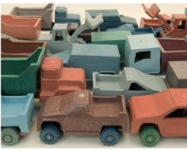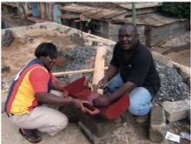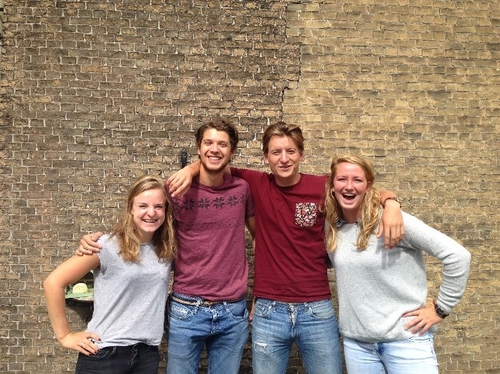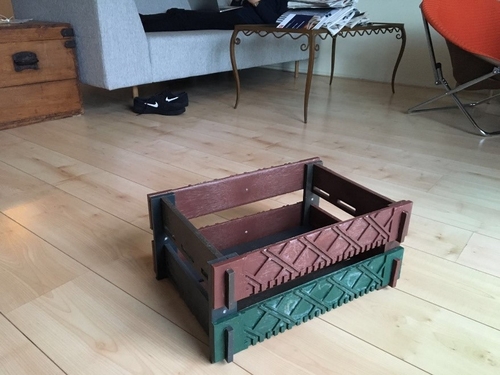Walking through Amsterdam, the capital city of the Netherlands, you have to watch your
step for cyclists coming from every single direction. There is no street without cyclists
and there’s no street without bicycles parked. About one fifth, estimated with what is
seen on the streets, of the bicycles in the Netherlands have a crate in front of the
handlebar, generally made out of wood or plastic. The crates are used for the transport
of for example, grocery, which basically comes down to plastic wrapped articles in
plastic bags. Luckily most of this plastic ends up in bins and nowadays also in special
plastic bins to be recycled. Imagine this doesn’t happen, and the entire beautiful city
would be drowning in plastic waste. Unfortunately, this is happening in other countries.
Globally, over 260 million tonnes of plastic is produced every year. Nearly one trillion
plastic bags are produced and used globally per annum. More than half of these plastic
bags, the most important user of plastic materials, end up in urban waste streams.
(Oyake‐Ombis, 2012)
Figure 1.1 – an impression of bicycles with crates in the Netherlands
Let’s zoom in on Kenya, where plastic waste is a big problem. In the major cities
of Kenya, namely Nairobi, Mombasa, Kisumu and Nakuru, plastic waste constitutes
about ten per cent of the cities’ waste streams. In Kenya 192,836 tonnes of plastic
material is produced each year, conducted by the Kenya National Cleaner Production
Centre. More than half of bags end up in the solid waste stream (Oyake‐Ombis, 2012). All
off this plastic waste has a bad influence on the environment; it results in dying animals,
smutty seas and streets, poor growing plants and disturbed ecosystems. This problem
has to be under the attention and has to be solved.
A company who wants to be a part of this accomplishment is Muima Toy
Industries, an injection moulding company in Kenya. The business is an initiative of
Wilson Mzungu, who is the owner of the factory. Muima Toy Industries turns used
plastics into plates, sandals but mainly toy cars. The industry started in 2003. Mzungu
has nine employees working in the factory and together they produce 200 cars a day.
These cars are being sold on the local Kenyan market. The plastic waste is collected from
the streets by homeless people that get paid for doing so. Through Muima Toy Industries
(Hereinafter referred to as ‘MTI’), not only nine Kenyan families are being supported,
but the living environment of the people in Muima improves as well. Wilson Mzungu is
also devoted to the wellbeing of orphans teaching them entrepreneurial skills for a
potentially brighter future. These days MTI would like to expand its business to the
Dutch market. For this purpose a bicycle crate was developed and produced in 2011.
How great would it be; you are walking through Amsterdam where all the bicycles with
the crates on this moment, instead will have the bicycle crate from MTI on their bicycle.
Known that there are made out of recycled plastic that improved the environment in the
Kenyan streets. This would be a dream come true.
Figure 1.2 – Wilson Mzungu and his wife

Figure 1.3 – The toy cars
We, a group of four students from de TU Delft, want to realize this dream.
Our names are Carolien van Mens, Esmée de Bruijn, Reinoud de Klerk & Marijn Duvekot.
We are studying respectively Maritime Technology, Applied Earth Sciences and Civil
Engineering. While writing this, we are about to start the Minor International
Entrepreneurship & Development. Our wide variety of knowledge is going to be helpful,
because every occurring problem will, without even regarding personal interests and
skills, be approached from at least three different angles. We are very much looking
forward to start with the following six months.
Figure 1.4 – Esmee de Bruijn, Reinoud de Klerk, Marijn Duvekot and Carolien van Mens
Our contact with Wilson Mzungu is initiated by Emma van Bruggen en Lotte Jacobse. In
2013 Lotte and Emma van came in contact with Guido Potters, an Industrial Designer
who works with Doctors Without Borders in Kenya. He was enthusiastic about a plastic
recycle company in the city of Muimas and already tried to help Wilson Mzungu, the
owner of the recycling factory, during his spare time. The enthusiasm of Guido has
inspired Emma to start ‘Relive Plastic’. Whilst working on this project they developed a
bicycle crate for the Dutch market with the help of a Dutch bicycle factory. The
development and the realisation of the crate, however, didn’t go as planned and took
longer than they thought.
After a long time of working on the crate, Lotte and Emma received an email of Wilson
Mzungu with pictures of a realised prototype of the bicycle crate in the spring of 2016.
Happily surprised this was reason enough for Emma and Lotte to approach the TU Delft
to send a new project team towards Muima Toy Industries in Kenya.
Unfortunately the bicycle crate does not yet reach the requirements of the
stricter and exacting Dutch market. Beside the goal of reaching the Dutch market, this is
an important part we have to work on, where many challenges have to overcome. We
are very much looking forward working on the project together with Wilson Mzungu.
Let’s hope the first container filled with bicycle crates will serve the Dutch market when
our work is done.
Figure 1.5 – the bicycle crate
This rapport is written by Carolien van Mens, Esmée de Bruijn, Reinoud de Klerk &
Marijn Duvekot, as presented earlier. From now on we will refer to our team as ‘Relive
Plastic’. In this rapport we will discuss the following points, first off the project will be
described and the approach will be discussed. After that we will analyse respectively
Muima Toys Industries, the crate, plastics, and Kenya itself.



